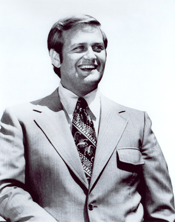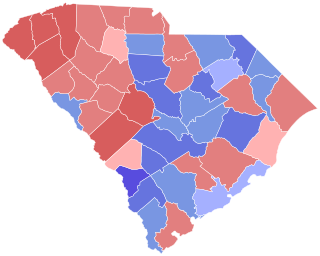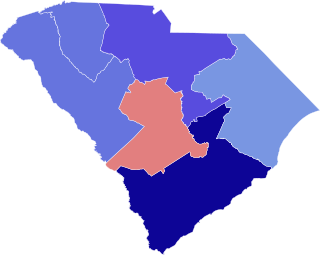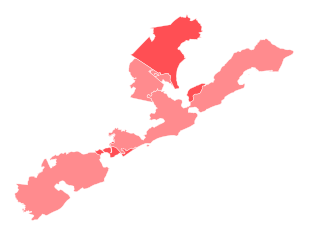
James Burrows Edwards was an American politician and administrator from South Carolina. He was the first Republican to be elected governor of South Carolina since the post-Civil War Reconstruction era in the 1870s. He later served as the U.S. secretary of energy under Ronald Reagan.

Lucius Mendel Rivers was a Democratic U.S. Representative from South Carolina, representing the Charleston-based 1st congressional district for nearly 30 years. As chair of the House Armed Services Committee, Rivers developed a reputation for his unwavering support of American involvement in the Vietnam War. His reputation suffered as the American public at large turned against further escalation in the Vietnam War. In 1968, Rivers condemned American servicemen who attempted to stop the My Lai massacre, labeling them as "traitors". Rivers served in the House until his death in 1970.

South Carolina's 1st congressional district is a coastal congressional district in South Carolina, represented by Republican Nancy Mace since January 3, 2021. She succeeded Democrat Joe Cunningham, having defeated him in the 2020 election. Cunningham was the first Democrat to represent the district since the 1980s.

The 1974 South Carolina gubernatorial election was held on November 5, 1974 to select the governor of the state of South Carolina. Initially considered a longshot candidate, Republican James B. Edwards defeated Democrat W. J. Bryan Dorn with a narrow majority of the vote.

Mendel Jackson Davis was an attorney and a United States Representative from South Carolina.

Thomas Forbes "Tommy" Hartnett is a former American politician who served as a U.S. Representative from South Carolina.

The 2004 United States Senate election in South Carolina was held on November 2, 2004. Longtime incumbent Democratic U.S. Senator Fritz Hollings retired, and Republican U.S. Representative Jim DeMint won the open seat. DeMint was the first Republican to hold this Senate seat since 1879, and the first Republican to ever be popularly elected to the seat.

The 1968 United States House of Representatives elections in South Carolina were held on November 5, 1968, to select six Representatives for two-year terms from the state of South Carolina. The primary elections were held on June 11 and the runoff elections were held two weeks later on June 25. All five incumbents who ran were re-elected and the open seat in the 5th district was retained by the Democrats. The composition of the state delegation remained five Democrats and one Republican.

The 1986 United States House of Representatives elections in South Carolina were held on November 4, 1986, to select six Representatives for two-year terms from the state of South Carolina. The primary elections for the Democrats and the Republicans were held on June 10 and the runoff elections were held two weeks later on June 24. All four incumbents who ran were re-elected and the Democrats picked up one of the two open seats vacated by the Republicans. The composition of the state delegation after the elections was four Democrats and two Republicans.

The 1992 United States House of Representatives elections in South Carolina were held on November 3, 1992, to elect the six U.S. representatives from the state of South Carolina, one from each of the state's six congressional districts. The elections coincided with the 1992 U.S. presidential election, as well as other elections to the House of Representatives, elections to the United States Senate and various state and local elections.

The 1978 South Carolina United States Senate election was held on November 7, 1978, to select the U.S. senator from the state of South Carolina. Popular incumbent Republican Senator Strom Thurmond defeated Democratic challenger Charles D. Ravenel.

The 1972 United States House of Representatives elections in South Carolina were held on November 7, 1972 to select six Representatives for two-year terms from the state of South Carolina. The primary elections were held on August 29 and the runoff elections were held two weeks later on September 12. Five incumbents were re-elected and the only change was in the 6th district where Republican Edward Lunn Young succeeded Democrat John L. McMillan, who was defeated in the Democratic primary. The composition of the state delegation after the elections was four Democrats and two Republicans.

The 1978 United States House of Representatives elections in South Carolina were held on November 7, 1978, to select six Representatives for two-year terms from the state of South Carolina. The primary elections for the Democrats and the Republicans were held on June 13. All five incumbents who ran were re-elected, but the open seat in the 4th congressional district was taken by the Republicans from the Democrats. The composition of the state delegation after the elections was four Democrats and two Republicans.

The 1980 United States House of Representatives elections in South Carolina were held on November 4, 1980, to select six Representatives for two-year terms from the state of South Carolina. The primary elections for the Democrats and the Republicans were held on June 10 and the runoff elections were held two weeks later on June 24. Three incumbents were re-elected, but John Jenrette of the 6th congressional district was defeated in his bid for re-election and the open seat in the 1st congressional district was taken by the Republicans from the Democrats. The composition of the state delegation after the elections was four Republicans and two Democrats.

The 1994 United States House of Representatives elections in South Carolina were held on November 8, 1994, to select six Representatives for two-year terms from the state of South Carolina. The primary elections for the Democrats and the Republicans were held on August 9 and the runoff elections were held two weeks later on August 23. All four incumbents who ran were re-elected and the Republicans won both of the open seats in the 1st congressional district and the 3rd congressional district. The composition of the state delegation after the elections was four Republicans and two Democrats.

The 1974 United States House of Representatives elections in South Carolina were held on November 5, 1974, to select six Representatives for two-year terms from the state of South Carolina. The primary elections were held on July 16 and the runoff elections were held two weeks later on July 30. Three incumbents were re-elected, Democrat John Jenrette defeated incumbent Republican Edward Lunn Young in the 6th district and the two open seats in the 3rd and 5th districts were retained by the Democrats. The composition of the state delegation after the elections was five Democrats and one Republican.
Benjamin Frasier Jr. is a perennial candidate for political office in South Carolina, having run for Congress over fifteen times since 1972. He became the Democratic Party nominee for the November 2010 election, "surpris[ing] observers" by beating retired Air Force Reserve Colonel Robert Burton in South Carolina's 1st congressional district Democratic Party primary, with 56 percent of the vote to Burton's 44 percent.

A special election for South Carolina's 1st congressional district was held on May 7, 2013, to fill the seat following the resignation of U.S. Representative Tim Scott, who was appointed to the United States Senate by Governor Nikki Haley to fill the seat previously held by Jim DeMint. DeMint resigned from the Senate on January 2, 2013, to accept a position as president of The Heritage Foundation.

A general election was held in the U.S. state of South Carolina on November 4, 2014. All of South Carolina's executive officers were up for election as well as both United States Senate seats, and all of South Carolina's seven seats in the United States House of Representatives.

These six off-year races featured special elections to the 113th United States Congress to fill vacancies due to resignations in the United States House of Representatives. Two were due to Congressmen taking seats in the United States Senate, one resigned to take jobs in the private sector, one resigned to take a job in the public sector, and one resigned due to an impending federal indictment regarding misuse of campaign funds.



















